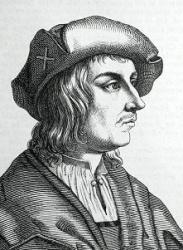
1479 - 1534 Person Name: L. Spengler, 1479-1534 Scripture: Romans 5 Author of "Durch Adam's sünde wurden wir" in Deutsches Gesangbuch für die Evangelisch-Luterische Kirche in den Vereinigten Staaten Spengler, Lazarus, was the 9th of the 21 children of Georg Spengler and Agnes his wife, and was born March 13,1479, at Nürnberg, where his father was clerk of the Imperial court of Justice (Landgerichtschreiber). He entered the University of Leipzig in 1494; but on the death of his father on Dec. 27, 1496, he returned to Nürnberg, obtained a position in the town clerk's office, in 1507 became himself town clerk (Raths Syndikus), and in 1516 also Rathsherr. When Luther was passing through Nürnberg, in 1518, on his way to Augsburg, Spengler made his acquaintance. He warmly espoused the Reformation doctrines, published in 1519 his Schutzre in Luther's favour, and himself became one of the leaders in the Reformation work at Nürnberg. He was one of those condemned by name in the Bull of Excommunication launched by Pope Leo the Tenth, on June 15, 1520, against Luther and his friends. Dr. Eck sent the Bull to the Town Council of Nürnberg, and urged them to proceed against Spengler, but they ignored it, and then sent him as one of their representatives to the Diet of Worms, in April 1521. In 1525 Spengler went to Wittenberg to consult with Luther and Melanchthon as to turning the Benedictine Aegidienstift (Schottenkloster) into an Evangelical Gymnasium, and this was opened as such by Melanchthon on May 23, 1526. Spengler was also the prime mover to the Visitation of 1528, and upheld strict Lutheranism in the negotiations at the Diet of Augsburg in 1530. He died at Nürnberg, Sept. 7, 1534 (Koch, i, 308 ; Will's Nürnbergisches Gelehrten-Lexikon, iii., p. 731; Herzog's Real-Encyklopädie, xiv., 516).
Spengler was a trusty friend and valued counsellor of Luther and the principal Reformers of Germany. He also interested himself in the improvement of the church services, and in 1532 was able to have an authorised Liturgy (Kirchenordnung) printed. He wrote a considerable quantity of verse, sacred and secular ; but only two hymns are ascribed to him.
The one is an indifferent version of Ps. cxxvii., beginning "Vergebens ist all Müh und Kost." The other is:—
Durch Adams Fall ist ganz verderbt. Fall and Redemption. First published in the Geystliche Gesangk Buchleyn, Wittenberg, 1524, and thence in Wackernagel, iii. p. 48, in 9 stanzas of 10 lines…During the Reformation period it attained a wide popularity as a didactic and confessional hymn of the Evangelical faith. It is one of the most characteristic hymns of the time, conceived in the spirit of deep and earnest piety, eminently Scriptural, and setting forth the Reformation teachings in concise and antithetical form, but is however too much like a system of theology in rhyme.
The translations are:—- 1. "By Adam's fall was so forlorne." By Bishop Coverdale, 1539, reprinted in his Remains, 1846, p. 556. 2. "When Adam fell our total Frame." By J. C. Jacobi in his Psalmodia Germanica, pt. ii., 1725, p. 17. [Rev. James Mearns, M.A.]
--Excerpts from John Julian, Dictionary of Hymnology (1907)
Lazarus Spengler



